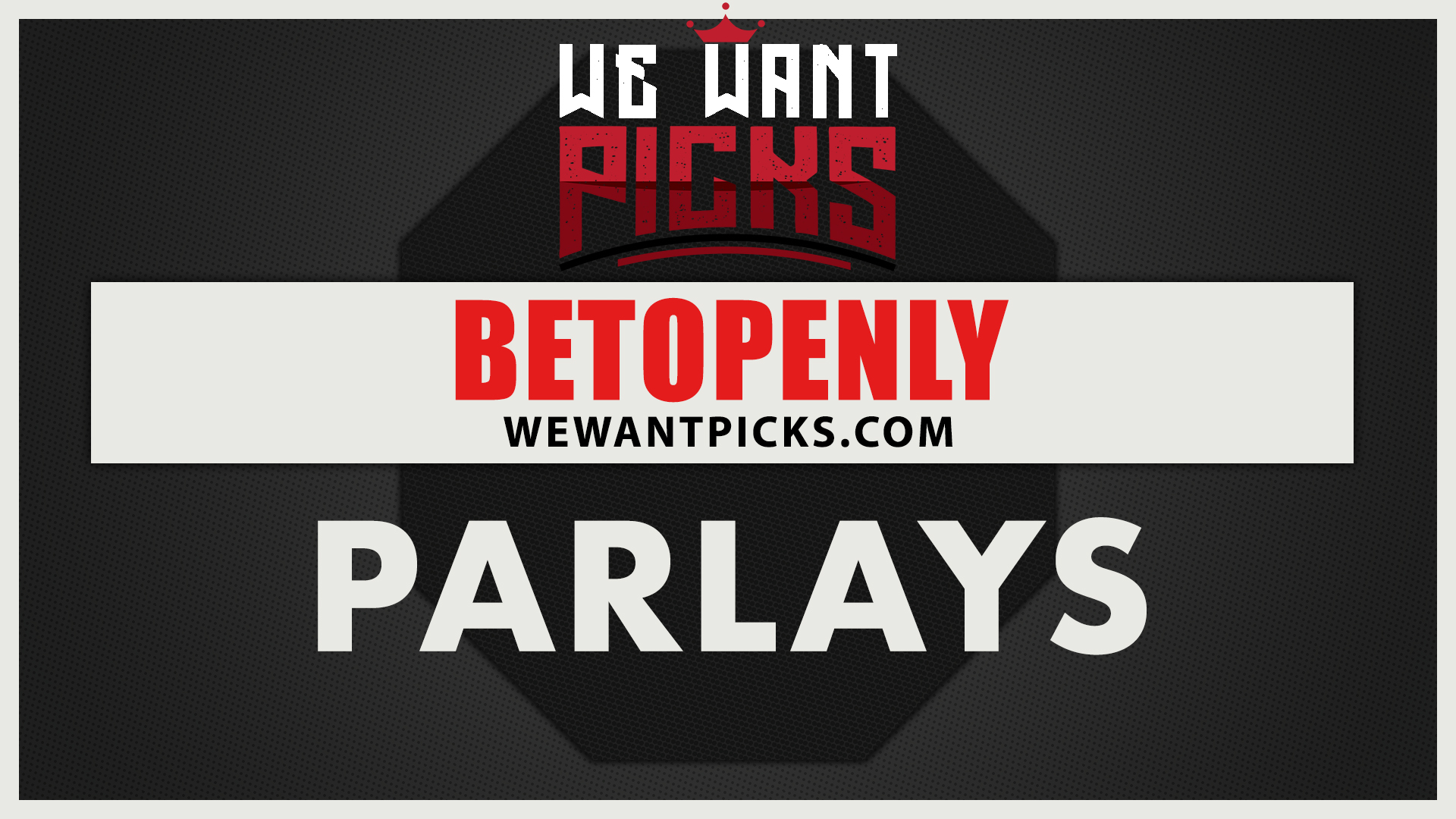You have heard the two sided argument in the betting world surrounding parlays since the beginning of time. One side believes that they are sucker bets and should be avoided at all cost. The other side thinks they are a great way to increase your payout on otherwise unfavorable odds. The truth probably lies somewhere in the middle.
BetOpenly has tried to bridge the gap by offering both sides of the parlay on their platform. You see, BetOpenly is not a traditional sportsbook, but rather a peer-to-peer betting network that connects sports bettors, and essentially facilitates the wager, for a 1% fee. That's their version of juice. Or at least that is how they advertise themselves. When it comes to parlays however, things get a bit murky.
BETTING BETOPENLY PARLAYS
If you are the person placing the parlay you would be considered the “bettor” when it comes to a BetOpenly parlay. The advantage of being on the bettor side of the parlay is that you get to take advantage of the juiceless betting odds. Great, right? Not so fast.
You see, in order to entice someone to play the role of the house to your parlay, BetOpenly had to come up with something. That something was to decrease the multiplier that parlays are typically paid out at, just like the more aggressive sportsbooks do with their increased juice. When you mention this to a BetOpenly faithful you will hear back;
“But the odds are so much better that it's still good for the person placing the parlay!”
Let’s explore that wildly false statement a bit, shall we? To see what happens with the odds I have created a UFC Vegas 93 parlay on BetOpenly and then plugged the available BetOnline odds into a parlay calculator to see what the true odds would be with their lines on the fight.
First, here were the available odds on BetOnline at the time I placed the bet on BetOpenly as well as my actual ticket from BetOpenly;

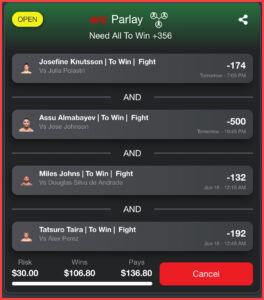
Next, let's take a look at what that parlay should truly pay out with no juice using both the BetOpenly odds, and the BetOnline Odds, using the parlay calculator on Action Network;
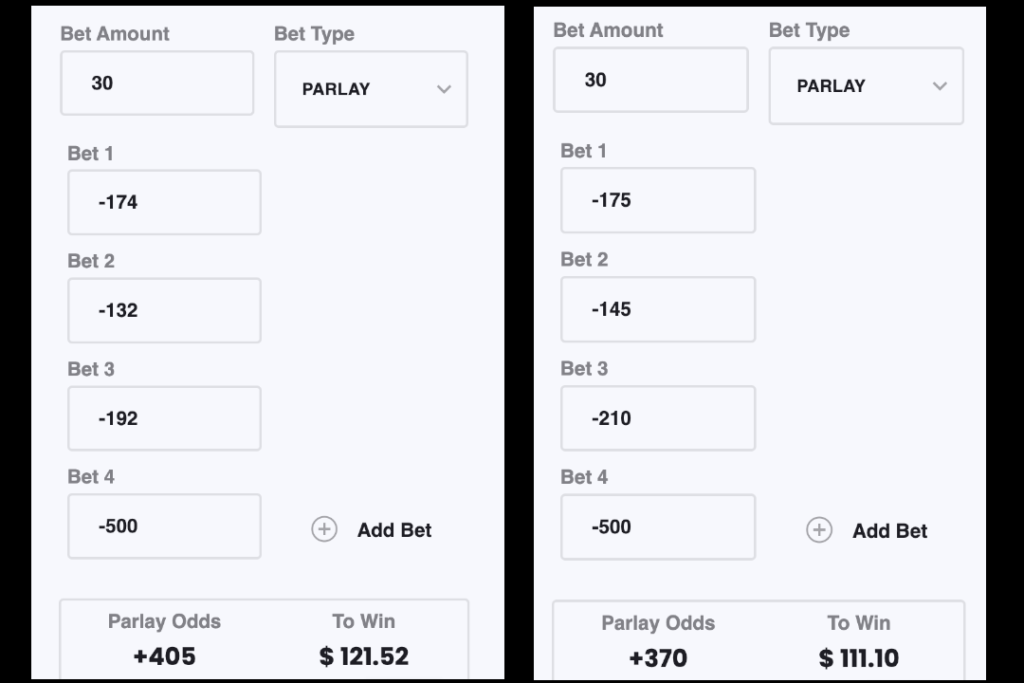
As you can see that parlay would normally pay out at +405 using normal parlay math, and using BetOnline odds it would still payout at +370. Unfortunately that same parlay on BetOpenly only pays out at +356 because BetOpenly. Here is the image of my parlay that I placed on BetOpenly showing that as well as an image of a BetOnline ticket showing better odds on the parlay despite having the same, or worse, odds on every leg. The BetOnline odds shown below for Josefine Knutsson are even worse than the ones I used above because it was a bit of time before I could make the ticket on BetOnline.
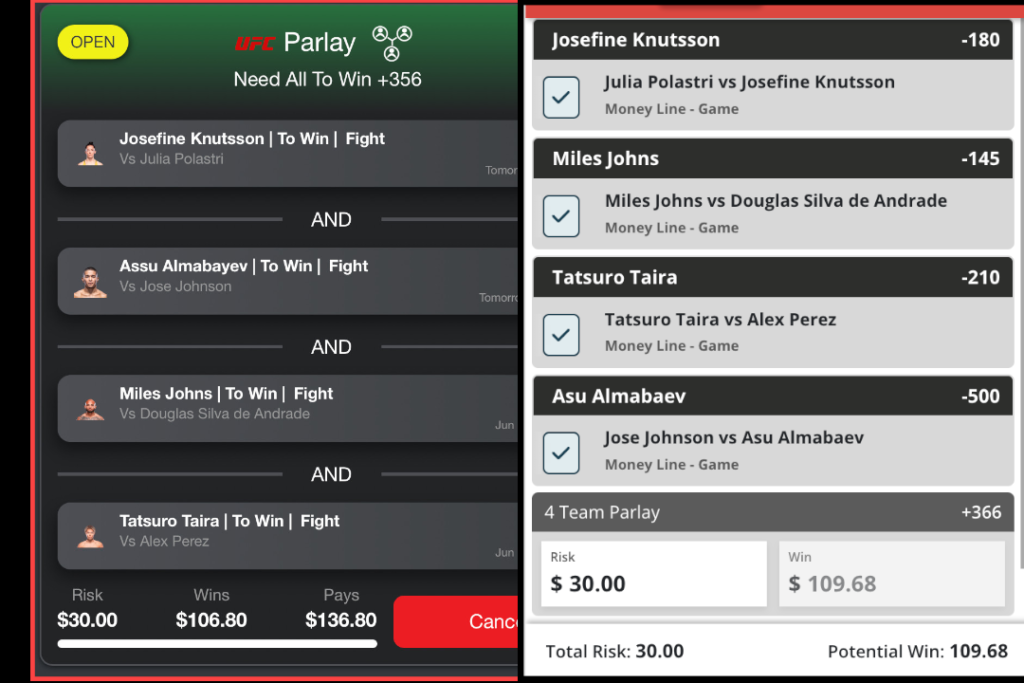
Even when using the “worse odds” to include all the sportsbook juice from the betting line, the parlay multiplier, and even inflated lines from the original math, you are still slightly better off playing your parlay there than you would be at BetOpenly.
I can't confirm this is the reasoning, but I believe the problem is that BetOpenly used house math to entice someone to be the house side which lowered the multiplier on 2 leg parlays to 2.8x or 2.73x (their website says both in two different locations) and then continued using that math for three legs and beyond as well. Sportsbooks like BetOnline and BetUS (I am sure more as well, but these were the only two I verified) stop using the funny math for three legs and more, they only use it for two leg parlays.
BEING THE HOUSE FOR A BETOPENLY PARLAY
After reading that BetOpenly quite literally decreased the winning payout on the bettor side to entice someone to be the house, you would assume that the house is the side to be on right?
Well again, not so fast. There are some caveats with being the “house” that you should know about. Unfortunately for me I had to learn about this system the hard way, so hopefully I can spare you the frustration of a boring week of UFC betting should this same thing happen to you.
I decided that my play for UFC Vegas 93 was going to be to house one parlay that I thought was unlikely to hit. I was actually intending to make content supporting BetOpenly with this bet, so I limited myself at $100 worth of exposure for the week and chose to house this parlay;
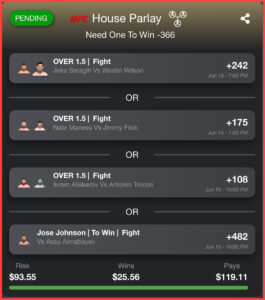
Obviously when you are taking the house side of the parlay you have to put up a significantly higher amount of money than the person placing it to cover the wager because you only need one leg to break. So I put up $93.55 at advertised odds on my side of -366. My logic on this was simple, I was getting three over 1.5 round lines on an MMA parlay. I like my chances of one of three fights going over that low round line. The day after I “housed” that parlay, the Ikram Aliskerov fight dropped.
It was the most favorable line on the entire parlay to the “house” (me), and the riskiest line on the entire parlay for the person on the bettor side in terms of implied probability. The odds on the parlay were significantly worse for him without that leg – and significantly better for me – which changes everything about the bet.
Let’s be clear, I am not a sportsbook, BetOpenly is not a sportsbook. The entire reason they are allowed to operate without licensing and regulation hinges on that point. They are simply facilitating a wager between two people. A wager whose terms had changed with the scratched fight. I understand using the idea of “housing” the parlay is a cute way to market – but at its core it's just a bet between two people.
Common sense says the bet should just void once a leg was removed since there is no way to gauge whether or not I would have taken that wager without that leg to begin with. That is not what happens however. You being on the “house” side of the sportsbook are expected to just continue with the parlay without the odds even adjusting or receiving any of your money back. BetOpenly doesn’t want to be considered, or operate like, a sportsbook, but they expect you to.
In truth, I would be fine with that as well if the odds were adjusted immediately as they would be on a sportsbook, but they are not. As the house, your money stays tied up into this parlay until AFTER the event has finished, regardless of whether or not you need that amount to cover the remaining bet.
So as the house I am left with $93.55 tied up into this parlay that I should only need around $43 to cover. The parlay odds have been more than cut in half, and I don’t even get to know what odds I am playing. I was told by both customer service, and BetOpenly founder Gino Donati, that should the bettor win the parlay he would be paid out at adjusted odds and I would receive a partial refund. I was also told that should I win the parlay, I would just win the full amount like nothing happened.
Here the “house” sits with more money tied up in a bet than is required to cover it, with no idea what multiplier is being applied to the new wager terms since it is listed no where on their website, and not a single person on the BetOpenly team, including the founder, can tell you anything other than, “the odds will adjust after the API grades the leg as a push” – which won’t be until after the event.
This is also not to mention that the leg in question was NOT a push, it was a canceled fight that was scratched days before the event. A push implies a draw on the bet – the bet no longer exists once the fight is canceled prior to the start of the event.
BETOPENLY PARLAY ACCOUNTING ERRORS
I feel like Billie Mays right now. But wait…there’s more!
BetOpenly is charging their customers that house parlays juice on the canceled legs that have been graded as pushes. I won the parlay that I have been using an example in this article, the odds didn't update at all when it was completed. I was awarded the win and then charged juice on the entire amount, despite only needing about half the money I put up to cover the parlay.
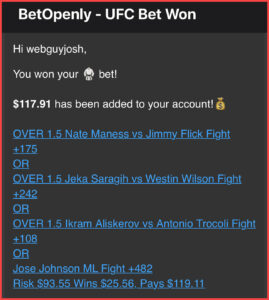
One might say, 50 cents, who cares…and for the most part I agree. Except it's actually a massive boost to BetOpenly’s bottom line when their entire rake on that transaction should have been about 60 cents, and then instead took $1.19. There is also a moral aspect to it as well, BetOpenly shouldn't have been in possession of that money to tax it in the first place.
Now multiply that 40% boost BetOpenly is getting across every single parlay that included one of the two scratched fights from UFC Vegas 93, or any scratched fight from any UFC event for that matter. Include every single parlay with a scratched golfer, tennis player, race car driver, or any other individual sports/eSport BetOpenly offers action on where a scratch cancels one of the legs of the parlay. This is actually a pretty sizable boost BetOpenly is taking from their customers that they should not be entitled to.
The real question is, do I think it’s intentional? I have gone to great lengths to try and explain this issue to Gino Donati. I reached out to him about the problem and that got me called “impatient” and a “little diva” – so then I made a video for him a day or two later walking him through the problem – and that was responded to with a “thanks for the feedback” and one of those little surfer bro emojis. I even waited a month to write this to give them time to fix it. No dice unfortunately.
As annoying, and out of line, as those responses were, I don't think it was intentional. I believe that it is more so just an oversight in the way that things work with individual sports versus team sports, where scratched legs wouldn't even be an issue.
Gino recently sent out an email that contained this gem of a quote from him about another issue where users were taking advantage of an obvious glitch to get other users to accept parlays where winning was not possible. I would like to think this sentiment will be applied to this issue as well;
“Stealing from other users is a zero moral act. We simply don't want or need these types of users. Report ALL exploitations to support.” – Gino Donati
FINAL REVIEW OF BETOPENLY PARLAYS
In case you haven't picked up on the theme here yet, you probably shouldn’t bother wasting your time playing either side of parlays on BetOpenly. You are only losing more with BetOpenly when it comes to BetOpenly parlays as they sit when it comes to individual sports like MMA. Two team parlays are advantageous to the bettor, and three leg or more parlays are advantageous to the house. Unfortunately the house assumes the risk of all dropped legs and then gets charged juice on dead money. There really is no happy balance on this platform when it comes to UFC parlays as they are executed today. Hopefully things change.

